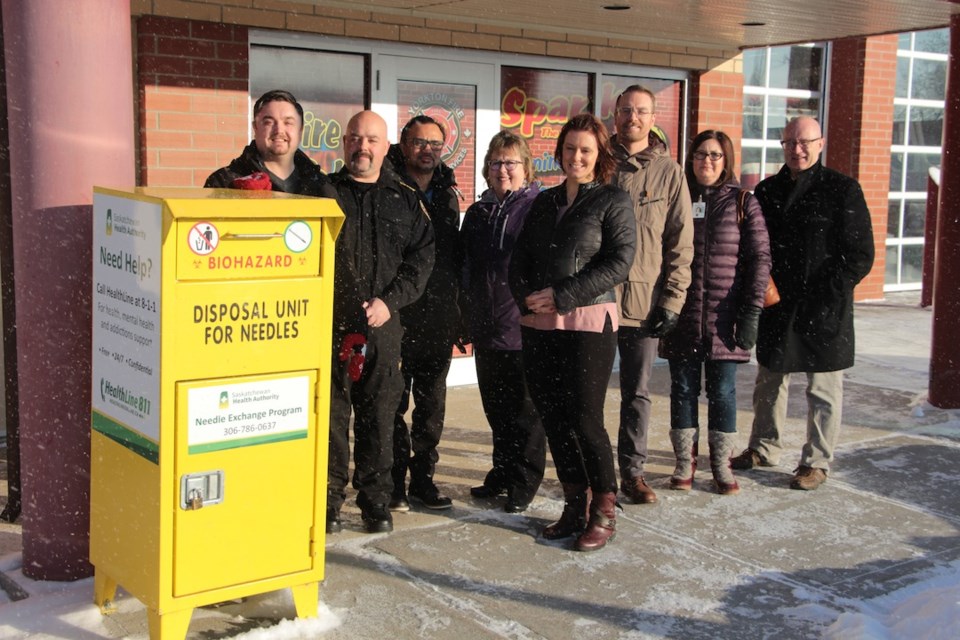There are now three locations to discard used needles in Yorkton. Part of a harm reduction strategy, the three needle drop bins have been installed at the Yorkton Fire Hall, the Yorkton Regional Health Centre and SIGN on Broadway to give a safe, convenient, place to discard any sharps.
Dr. Ashok Chhetri, Saskatchewan Health Authority Medical Health Officer for Yorkton, said that the harm reduction is no different from things like seat belts or helmets, ways to keep the community safe.
“We have a comprehensive program. This is part of the public health disease control program.”
This program also includes providing clean needles and syringes, safe injection kits, naloxone kits to prevent overdose deaths and education programs. The sharps disposal is one component of the overall program to help reduce harm.
In the case of sharps disposal it’s also a response to a problem that Saskatchewan faces surrounding HIV rates. Chhetri explained that in this province, the highest risk factor surrounding HIV is intravenous drug use, and the HIV rates are the highest in Canada.
“Our aim is to provide them with the support and services so theyh can make a choice of having a clean needle, not to go sharing needles. We want to prevent the spread of HIV and hepatitis C.”
Having the drop bins will reduce the number of needles found, and Chhetri said that having the bins available will help reduce the number of discarded needles found.
The bins also have information about local services and where people should call if they need advice.
Juanita Polegi with the Yorkton Chamber of Commerce said that she’s glad to see the business community was part of the process, to ensure that the drop bins are in appropriate places. She feels like the fire hall location, for example, is a logical place because it’s somewhere people are comfortable approaching and also near the downtown.
Fire Chief Trevor Morrissey said that they were advocating a needle drop bin because it’s a way to prevent injury in the community, while people often didn’t know what to do with sharps and would discard them in ways that introduce risk to others in the community. Having a needle drop bin in a convenient location, it will service everyone who uses sharps in their life, whether it’s due to disease or other reasons.
“Inappropriate or improper disposal, that’s the problem. The improper disposal in our downtown core, it’s kind of that out of sight, out of mind for some people... You get them in back alleys, you can tell people aren’t doing it to be malicious. They just don’t know where to take them, so we’re providing a visible bin that they can take them to, no questions asked.”
Morrissey said that it’s important that people look at the bins, to ensure that it’s a needle drop location, because there are other bins in the city which are yellow, but not needle drop locations. He said that people have to look for the SaskHealth decals and the Needle Disposal signage to make sure they’re putting sharps in the right place.
Plenty of people might not have experience with sharps and what to do if they find them. Morrissey said that if people call 306-786-1795 they can arrange for education to show people how to properly handle sharps. If someone can’t safely handle the sharps, for example not having a container to transport it, they can call 306-786-1797 and give their name, the time and, most importantly, the location of the needle, in order to get someone to safely handle it.
“The more community involvement we can get, the more normalcy comes to it and it’s just another day in the life.”
If someone is poked by a needle, Chhetri said they need to wash with soap and water and head to the emergency room. He also said do not squeeze the injury. He notes there hasn’t been HIV transmission due to a needle stick injury, but recommends people follow protocol to ensure there is no risk of infection.




